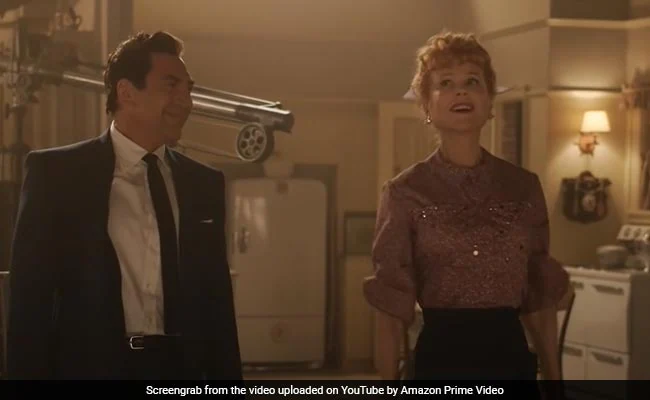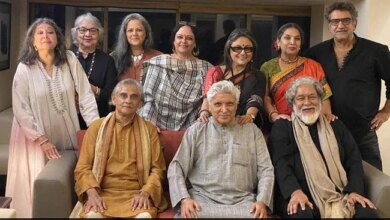Being The Ricardos Review: Nicole Kidman, Javier Bardem Strike It Out Of The Park

[ad_1]
Being The Ricardos Review: A still from the film. (Image courtesy: minnalmuraliofficial )
Cast: Nicole Kidman, Javier Bardem, JK Simmons, Nina Arianda, Tony Hale, Alia Shawkat, Jake Lacy
Director: Aaron Sorkin
Rating: 3 stars (out of 5)
The initial misgivings are inevitable. Nicole Kidman does not look like Lucille Ball. Nor does Javier Bardem resemble Desi Arnaz. But it takes the reservations no time at all to melt away as Being The Ricardos, streaming on Amazon Prime Video, unfolds and the two lead actors do not miss a trick as they bring alive the real-life television stars of another era in a film that addresses the past with an eye firmly on the present.
Kidman (who, in black-and-white flashes, nails Lucy’s nasal, excitable dialogue delivery) and Bardem strike it out of the park with impressive flourish. Their performances – and those of J.K. Simmons, Nina Arianda and Alia Shawkat – help the film paper over its crinkles. The downsides are in any case minimal.
Being The Ricardos, written and directed by Aaron Sorkin, presents a compellingly lively account of a high-strung couple grappling with personal and professional crises and negotiating the pressures and demands of stardom. There is a great deal of history and hysteria tucked into the story – the fictionalized incidents in the screenplay are all derived from true events. The writing imparts multiple layers that rest on both interpretation and expositional detailing. Sorkin is great at both.
That is not to say that Being The Ricardos is a perfect film. It attempts to pack too much into its a-week-in-the-life-of-the-protagonists story and parts of the narrative appear somewhat rushed and disorienting. It is, however, salvaged, nay enlivened, by all the Sorkin trademarks – corrosive wit, snappy dialogues and a way with actors.
In one scene, one of the characters suggests to Lucille Ball that her persona in I Love Lucy is an infantilized version of who she could be. Stan Laurel and Lou Costello are also mentioned for perspective. The star of the hit sitcom takes umbrage and insists that her character isn’t dumb.
Being The Ricardos is a story of a marriage and two careers. It is also an exploration of the nature and substance of comedy and of what goes into writing sketches and gags for television and, by extension, for the big screen. What emerges as ideas are tossed around, knocked down and constantly reworked is that tickling the funny bone is never as simple as it sounds.
Being The Ricardos provides a sense of what Sorkin regards as real comedy. The film does not incorporate enough of the outright slapstick comedy that Lucille Ball built her career around. The only moments of pure, unbridled farce that find their way into the film are in the snatches that show Lucy stomping on a vat of grapes and losing an earring in it. That was the quintessential Lucy Ricardo, the fictional comic livewire that Lucille had a ball with on the television screen.
That “kinetically gifted” (a phrase that Desi uses to describe what sets her apart from the crowd) Lucille Ball isn’t what Being The Ricardos is out to showcase. Had it done so, this would have been a completely different and probably more entertaining film. Instead, what we see is a finicky performer who has a keen sense of what works in a scene and in a gesture and is willing to go out on a limb to do things her own way.
A dining table scene – which constitutes a significant segment of the episode (Season Two, Episode Four, the year is 1952) being canned in the week that the film is set in – brings out the sharp differences of approach that erupt between the star and the director and the showrunner.
Spurred along by the sparkling performances from Kidman and Bardem (whose casting as the Cuban-born Desi Arnaz has generated some controversy), this behind-the-scenes drama about the making of the enormously popular early 1950s sitcom (it had a weekly viewership of 60 million) is replete with delights.
The film opens with a double blow for Lucille and Desi Arnaz. A Sunday broadcast, citing House Un-American Activities Committee documents, accuses the former of being a Communist. A tabloid publishes a report about the latter’s extra-marital indiscretions and speculates on the health of the marriage. Their careers and lives are pushed to the brink.
But amid the upheavals that the allegations trigger, life goes on for the super-successful comedy duo as work continues on another episode of I Love Lucy. Being The Ricardos isn’t interested only in the relationship between two television stars who are always in the public glare, but also equally in the creative process behind the sitcom that has catapulted a music bandleader and a B-movie actress into the big league.
The production hands, the writers, and the studio audience that watches the recording of the episodes all become parts of the story in varying degrees. As events unfold from Monday to Friday, tensions between the writers – executive producer Jess Oppenheimer (Tony Hale), Bob Carroll (Jake Lacy) and Madelyn Pugh (Alia Shawkat) – and the stars of the show reach a crescendo and begin to affect Lucy and Desi in their personal spaces.
Being The Ricardos is set in another era but its resonances are clearly current. Gender dynamics play a key role not only in the relationship between Lucille and Desi at home and in the studio but also among the writers. Madelyn, fleshed out delicately by Shawkat, has to reckon with the challenges of being “a woman in a comedy room”. Vivian Vance (Nina Arianda), who is Ethel Mertz in I Love Lucy, has reason to feel aggrieved due to the fact that her character’s body-type is a butt of jokes.
In a heart-to-heart that Lucy has with another I Love Lucy co-actor, the grumpy and hard-drinking William Frawley (J.K. Simmons, who is brilliant as always), she asserts that “I navigate male egos for a living”. The biggest one of them all belongs to Desi Arnaz, who loves all the success that his wife has achieved but is unable to set her fully free from the decision-making prerogatives that he has arrogated for himself.
Lucy lands the lead role in a film opposite Henry Fonda. She is understandably excited. She shares the news with Desi. He asks, almost incredulously, “You’re going to be a movie star?” Lucy’s counter-question sums up the uneasy equation between them despite their apparent parity: “Are you comfortable with that?”
Being The Ricardos is peppered with questions, answers and repartees. The script, crammed with unpredictable tics, ensures that the film does not degenerate into empty verbiage. Kidman and Bardem do the rest – they lend infectious verve to Being The Ricardos.
[ad_2]
Source link





